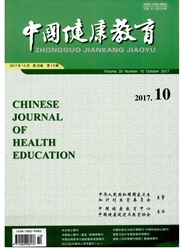

 中文摘要:
中文摘要:
目的了解资源整合过程中护士的心理健康状况及综合干预的效果。方法分别在“迁建调整”前后和干预前后采用焦虑自评量表(SAS)、症状自评量表(SCL-90)对62名护士进行测评并对比分析。结果干预后受调查护士SAS(45.72±7.53)及SCL-90测评因子中躯体化(1.48±0.46)、强迫症状(1.64±0.59)、人际关系(1.65±0.52)、焦虑(1.51±0.52)、敌对(1.51±0.77)低于干预前,差异有统计学意义(P〈0.05),抑郁、恐怖、精神病性、偏执因子分均低于干预前,但无统计学意义(P〉0.05)。结论虽然医院资源整合过程增加了护士的心理压力,但通过合理的干预方法能改善护士的心理压力,提高心理素质,从容应对生活事件。
 英文摘要:
英文摘要:
Objective To investigate mental health status of nurses during hospital resources integration period and effect of mental health intervention. Methods 62 nurses were assessed by Self-rating Anxiety Scale (SAS) and Symptom Checklist 90 (SCL -90) before and after the mental intervention as well as the "relocation and adjustment" period, respec- tively. Results After mental health intervention, SAS score (45.72± 7. 53) and the assessment factors of SCL - 90, such as somatization ( 1.48 ±0.46 ), obsessive-compulsive symptoms ( 1.64± 0. 59 ), relationships ( 1. 65 ± 0. 52 ), anxiety ( 1.51 ± 0. 52) and hostile entry ( 1.51 ± 0. 77), of the investigated nurses were lower than those before intervention. There were significant differences between the above groups ( P 〈 0.05 ). Although the assessment scores of SCL - 90 such as the depression, terror, psychotic and the paranoid factor were also lower than those before intervention, there were no significant differences between the above groups ( P 〉 0. 05). Conclusion Although psychological pressures of nurses were increased during the period of hospital resources integration, mental health situation of the nurses can be improved through proper men- tal intervention.
 同期刊论文项目
同期刊论文项目
 同项目期刊论文
同项目期刊论文
 期刊信息
期刊信息
